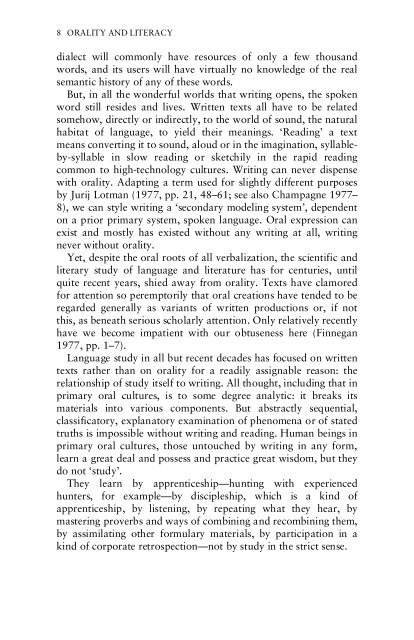Orality and Literacy: The Technologizing of the Word - Monoskop
Orality and Literacy: The Technologizing of the Word - Monoskop
Orality and Literacy: The Technologizing of the Word - Monoskop
You also want an ePaper? Increase the reach of your titles
YUMPU automatically turns print PDFs into web optimized ePapers that Google loves.
8 ORALITY AND LITERACY<br />
dialect will commonly have resources <strong>of</strong> only a few thous<strong>and</strong><br />
words, <strong>and</strong> its users will have virtually no knowledge <strong>of</strong> <strong>the</strong> real<br />
semantic history <strong>of</strong> any <strong>of</strong> <strong>the</strong>se words.<br />
But, in all <strong>the</strong> wonderful worlds that writing opens, <strong>the</strong> spoken<br />
word still resides <strong>and</strong> lives. Written texts all have to be related<br />
somehow, directly or indirectly, to <strong>the</strong> world <strong>of</strong> sound, <strong>the</strong> natural<br />
habitat <strong>of</strong> language, to yield <strong>the</strong>ir meanings. ‘Reading’ a text<br />
means converting it to sound, aloud or in <strong>the</strong> imagination, syllableby-syllable<br />
in slow reading or sketchily in <strong>the</strong> rapid reading<br />
common to high-technology cultures. Writing can never dispense<br />
with orality. Adapting a term used for slightly different purposes<br />
by Jurij Lotman (1977, pp. 21, 48–61; see also Champagne 1977–<br />
8), we can style writing a ‘secondary modeling system’, dependent<br />
on a prior primary system, spoken language. Oral expression can<br />
exist <strong>and</strong> mostly has existed without any writing at all, writing<br />
never without orality.<br />
Yet, despite <strong>the</strong> oral roots <strong>of</strong> all verbalization, <strong>the</strong> scientific <strong>and</strong><br />
literary study <strong>of</strong> language <strong>and</strong> literature has for centuries, until<br />
quite recent years, shied away from orality. Texts have clamored<br />
for attention so peremptorily that oral creations have tended to be<br />
regarded generally as variants <strong>of</strong> written productions or, if not<br />
this, as beneath serious scholarly attention. Only relatively recently<br />
have we become impatient with our obtuseness here (Finnegan<br />
1977, pp. 1–7).<br />
Language study in all but recent decades has focused on written<br />
texts ra<strong>the</strong>r than on orality for a readily assignable reason: <strong>the</strong><br />
relationship <strong>of</strong> study itself to writing. All thought, including that in<br />
primary oral cultures, is to some degree analytic: it breaks its<br />
materials into various components. But abstractly sequential,<br />
classificatory, explanatory examination <strong>of</strong> phenomena or <strong>of</strong> stated<br />
truths is impossible without writing <strong>and</strong> reading. Human beings in<br />
primary oral cultures, those untouched by writing in any form,<br />
learn a great deal <strong>and</strong> possess <strong>and</strong> practice great wisdom, but <strong>the</strong>y<br />
do not ‘study’.<br />
<strong>The</strong>y learn by apprenticeship—hunting with experienced<br />
hunters, for example—by discipleship, which is a kind <strong>of</strong><br />
apprenticeship, by listening, by repeating what <strong>the</strong>y hear, by<br />
mastering proverbs <strong>and</strong> ways <strong>of</strong> combining <strong>and</strong> recombining <strong>the</strong>m,<br />
by assimilating o<strong>the</strong>r formulary materials, by participation in a<br />
kind <strong>of</strong> corporate retrospection—not by study in <strong>the</strong> strict sense.

















